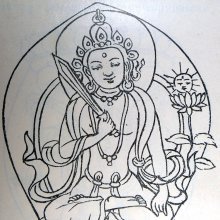Suryaprabha, Sūryaprabha, Sūryaprabhā: 14 definitions
Introduction:
Suryaprabha means something in Buddhism, Pali, Hinduism, Sanskrit. If you want to know the exact meaning, history, etymology or English translation of this term then check out the descriptions on this page. Add your comment or reference to a book if you want to contribute to this summary article.
Images (photo gallery)
(+1 more images available)
In Hinduism
Kavya (poetry)
Source: Wisdom Library: Kathāsaritsāgara1) Sūryaprabha (सूर्यप्रभ) is the name of the eighth book of the Kathāsaritsāgara, written by Somadeva in the 11th-century.
2) Sūryaprabha (सूर्यप्रभ) is the name of an ancient Vidyādhara king, according to the Kathāsaritsāgara, chapter 44. Accordingly, as Vajraprabha said to Naravāhanadatta: “... and though, by the favour of Śiva, a prince of the name of Sūryaprabha was ruler over us for a Kalpa of the gods, still he was only lord in the southern division, but in the northern division a prince called Śrutaśarman was emperor”.
3) Sūryaprabha (सूर्यप्रभ) is the name of an ancient king from Vakraloka, according to the nineteenth story of the Vetālapañcaviṃśati in the Kathāsaritsāgara, chapter 93. Accordingly, “... there is a city named Vakrolaka, equal to the city of the gods; in it there dwelt a king named Sūryaprabha, equal to Indra. He, like Viṣṇu, rescued this earth, and bore it a long time on his arm, gladdening all men by his frame ever ready to bear their burdens. In the realm of that king [Sūryaprabha] tears were produced only by contact with smoke; there was no talk of death except in the case of the living death of starved lovers, and the only fines were the fine gold sticks in the hands of his warders”.
The Kathāsaritsāgara (‘ocean of streams of story’), mentioning Sūryaprabha, is a famous Sanskrit epic story revolving around prince Naravāhanadatta and his quest to become the emperor of the vidyādharas (celestial beings). The work is said to have been an adaptation of Guṇāḍhya’s Bṛhatkathā consisting of 100,000 verses, which in turn is part of a larger work containing 700,000 verses.

Kavya (काव्य, kavya) refers to Sanskrit poetry, a popular ancient Indian tradition of literature. There have been many Sanskrit poets over the ages, hailing from ancient India and beyond. This topic includes mahakavya, or ‘epic poetry’ and natya, or ‘dramatic poetry’.
Purana and Itihasa (epic history)
Source: Wisdom Library: Varāha-purāṇaSūryaprabhā (सूर्यप्रभा) is the name of a beautiful damsel (kanyā), with black curly hair and red lips, according to the Varāhapurāṇa chapter 92. Sūryaprabhā (and other innumerable ladies) arose out of the agitation of Vaiṣṇavī while she was doing penance at Viśālā. For these young women, Vaiṣṇavī created the city Devīpura, containing numerous mansions with golden balconies, crystal stairs and water fountains, with jewelled windows and gardens.
Vaiṣṇavī is the form of Trikalā having a red body representing the energy of Viṣṇu. Trikalā is the name of a Goddess born from the combined looks of Brahmā, Viṣṇu and Maheśvara (Śiva).
The Varāhapurāṇa is categorised as a Mahāpurāṇa, and was originally composed of 24,000 metrical verses, possibly originating from before the 10th century. It is composed of two parts and Sūta is the main narrator.
Source: archive.org: Shiva Purana - English TranslationSūryaprabhā (सूर्यप्रभा) refers to “having mastered the sunshine”, according to the Śivapurāṇa 2.5.1 (“Description of Tripura—the three cities”).—Accordingly, as Sanatkumāra narrated to Vyāsa: “O great sage, when the Asura Tāraka was killed by Skanda, the son of Śiva, his three sons performed austerities. [...] In the summer season they mastered sunshine (sūryaprabhā) [sūryaprabhāṃ jitvā]. They lighted fires in all directions. Standing in their midst they performed sacrifice with great devotion for the attainment of success. They lay unconscious in the blazing sunshine. During the rainy season, they fearlessly bore all the showers on their heads. [...]”.

The Purana (पुराण, purāṇas) refers to Sanskrit literature preserving ancient India’s vast cultural history, including historical legends, religious ceremonies, various arts and sciences. The eighteen mahapuranas total over 400,000 shlokas (metrical couplets) and date to at least several centuries BCE.
Ayurveda (science of life)
Kalpa (Formulas, Drug prescriptions and other Medicinal preparations)
Source: Shodhganga: Edition translation and critical study of yogasarasamgrahaSūryaprabhā refers to a medicinal recipe mentioned in the Guḷikākhaṇḍa (verse 7.14) of the 15th-century Yogasārasaṅgraha (Yogasara-saṅgraha) by Vāsudeva: an unpublished Keralite work representing an Ayurvedic compendium of medicinal recipes. The Guḷikākhaṇḍa [mentioning sūryaprabhā] contains recipes that treat patients suffering from conditions such as shivering fever, bleeding, cough, heart diseases, chlorosis, piles, pain in vagina, constipation, etc.

Āyurveda (आयुर्वेद, ayurveda) is a branch of Indian science dealing with medicine, herbalism, taxology, anatomy, surgery, alchemy and related topics. Traditional practice of Āyurveda in ancient India dates back to at least the first millenium BC. Literature is commonly written in Sanskrit using various poetic metres.
General definition (in Hinduism)
Source: Cologne Digital Sanskrit Dictionaries: Monier-Williams1) sūryaprabha (skt.) lit: 'bright as the sun'; (sūrya-prabha)
2) of the king after whom the 8th Lambaka of the Kathā-sarit-sāgara is called ( [ -tā ] f.) Lit. Kathās.
3) [ sūryaprabha ] m. a kind of Samādhi Lit. Kāraṇḍ.
4) N. of the palace of Lakshmaṇā (wife of Kṛishṇa) Lit. Hariv.
5) of a serpent-demon Lit. Buddh.
6) of a Bodhi-sattva Lit. ib.
7) of various kings Lit. Kathās. Lit. Cat.
In Buddhism
Tibetan Buddhism (Vajrayana or tantric Buddhism)
Source: archive.org: The Indian Buddhist IconographySūryaprabha (सूर्यप्रभ) is another name for Jālinīprabha: a Bodhisattva commonly depicted in Buddhist Iconography, and mentioned in the 11th-century Niṣpannayogāvalī of Mahāpaṇḍita Abhayākara.—his color is red; his symbol is the sun-disc. Jālinīprabha is also known by the name of Sūryaprabha.
Sūryaprabha or Jālinīprabha is sometimes seen accompanying Mañjuśrī, as depicted in Buddhist Iconography.—[...] Sometimes Mañjuśrī is accompanied only by Yamāri, sometimes only by his Śakti or female counterpart, sometimes by Sudhanakumāra and Yamāri and sometimes again by the four divinities, Jālinīprabha (also called Sūryaprabha), Candraprabha, Keśinī and Upakeśinī. Though the last four are required to be present with Arapacana, they are nevertheless found in others also.

Tibetan Buddhism includes schools such as Nyingma, Kadampa, Kagyu and Gelug. Their primary canon of literature is divided in two broad categories: The Kangyur, which consists of Buddha’s words, and the Tengyur, which includes commentaries from various sources. Esotericism and tantra techniques (vajrayāna) are collected indepently.
Mahayana (major branch of Buddhism)
Source: Wisdom Library: Maha Prajnaparamita SastraSūryaprabhā (सूर्यप्रभा) refers to “sunlight”, according to Mahāprajñāpāramitāśāstra (chapter 2).—Accordingly, “People of sensitive and upright mind can easily obtain salvation. If these people do not hear the doctrine preached, they fall into grave difficulties. It is like the lotus (utpala) in the water: some are born, some ripen, some remain within the water without emerging. If they do not have sunlight (sūryaprabhā), they do not expand (vikasanti). The Buddha is like [the sunlight]: sent forth by his great loving kindness and great compassion (mahāmaitrīkaruṇā), that he might have pity for beings and preach the doctrine”.
Source: archive.org: Bulletin of the French School of the Far East (volume 5)Sūryaprabha (सूर्यप्रभ) [?] is the name of a Nāgarāja appointed as one of the Divine protector deities of Aśva, according to chapter 17 of the Candragarbha: the 55th section of the Mahāsaṃnipāta-sūtra, a large compilation of Sūtras (texts) in Mahāyāna Buddhism partly available in Sanskrit, Tibetan and Chinese.—In the Candragarbhasūtra, the Bhagavat invites all classes of Gods and Deities to protect the Law [dharma?] and the faithful in their respective kingdoms of Jambudvīpa [e.g., the Nāgarāja Sūryaprabha in Aśva], resembling the time of the past Buddhas.
Source: academia.edu: A Study and Translation of the GaganagañjaparipṛcchāSūryaprabha (सूर्यप्रभ) refers to “sunlight”, according to the Gaganagañjaparipṛcchā: the eighth chapter of the Mahāsaṃnipāta (a collection of Mahāyāna Buddhist Sūtras).—Accordingly, “To wit, the moon flower, the great moon flower, the most beautiful moon flower, the sunlight (sūryaprabha) flower, the sun-shining flower, the sun-loved flower (sūryakānta) flower, [...] [The flowers] were adorned with their own splendor, produced by immeasurable merits, and known by Bodhisattvas of the ten directions. The great three-thousand thousands of worlds were covered with those flowers, and all congregations of the Lord were filled with flowers (puṣpa) up to their knees [...].

Mahayana (महायान, mahāyāna) is a major branch of Buddhism focusing on the path of a Bodhisattva (spiritual aspirants/ enlightened beings). Extant literature is vast and primarely composed in the Sanskrit language. There are many sūtras of which some of the earliest are the various Prajñāpāramitā sūtras.
General definition (in Buddhism)
Source: Nichiren: Buddhism LibrarySūryaprabha; The bodhisattva Sunlight. One of the two bodhisattvas who attend Medicine Master Buddha. See Sunlight.
Sūryaprabha [日光菩薩] (Skt; Jpn Nikkō-bosatsu);
Languages of India and abroad
Sanskrit dictionary
Source: Cologne Digital Sanskrit Dictionaries: Edgerton Buddhist Hybrid Sanskrit DictionarySūryaprabha (सूर्यप्रभ).—(1) name of a Bodhisattva (in Mahāvyutpatti and Sādhanamālā follows Candraprabha): Mahāvyutpatti 690; Sādhanamālā 96.2; Gaṇḍavyūha 3.16; (2) name of a nāga: Mahāvyutpatti 3323; Mahā-Māyūrī 246.24; (3) name of a yakṣa: Mahā-Māyūrī 38.
Source: Cologne Digital Sanskrit Dictionaries: Cappeller Sanskrit-English DictionarySūryaprabha (सूर्यप्रभ).—[adjective] bright as the sun.
Source: Cologne Digital Sanskrit Dictionaries: Monier-Williams Sanskrit-English Dictionary1) Sūryaprabha (सूर्यप्रभ):—[=sūrya-prabha] [from sūrya > sūr] mfn. bright as the sun
2) [v.s. ...] m. a kind of Samādhi, [Kāraṇḍa-vyūha]
3) [v.s. ...] Name of the palace of Lakṣmaṇā (wife of Kṛṣṇa), [Harivaṃśa]
4) [v.s. ...] of a serpent-demon, [Buddhist literature]
5) [v.s. ...] of a Bodhi-sattva, [ib.]
6) [v.s. ...] of various kings, [Kathāsaritsāgara; Catalogue(s)]
7) [v.s. ...] m. of the king after whom the 8th Lambaka of the Kathā-sarit-sāgara is called (-tā f.), [Kathāsaritsāgara]
[Sanskrit to German]
Sanskrit, also spelled संस्कृतम् (saṃskṛtam), is an ancient language of India commonly seen as the grandmother of the Indo-European language family (even English!). Closely allied with Prakrit and Pali, Sanskrit is more exhaustive in both grammar and terms and has the most extensive collection of literature in the world, greatly surpassing its sister-languages Greek and Latin.
See also (Relevant definitions)
Partial matches: Prabha, Surya.
Starts with: Suryaprabhata, Suryaprabhatejas, Suryaprabhava.
Full-text (+320): Sauryaprabha, Suryaprabhiya, Suryaprabhata, Candraprabha, Suryaprabhatejas, Prahasta, Sukhavati, Dhanavati, Sudandika, Dushtadamana, Tejahprabha, Vatapi, Shambara, Vishaparvan, Siddhartha, kumudavati, Uluka, Suroshana, Vikataksha, Kuveradatta.
Relevant text
Search found 12 books and stories containing Suryaprabha, Sūryaprabha, Sūryaprabhā, Surya-prabha, Sūrya-prabha; (plurals include: Suryaprabhas, Sūryaprabhas, Sūryaprabhās, prabhas). You can also click to the full overview containing English textual excerpts. Below are direct links for the most relevant articles:
Garga Samhita (English) (by Danavir Goswami)
Verse 5.15.34 < [Chapter 15 - Seeing Sri Radha]
Verse 6.20.4 < [Chapter 20 - In the Description of the Second Fort, the Glories of Indra-tīrtha, etc.]
Kathasaritsagara (the Ocean of Story) (by Somadeva)
Chapter XLVIII < [Book VIII - Sūryaprabha]
Chapter XLVI < [Book VIII - Sūryaprabha]
Chapter XLV < [Book VIII - Sūryaprabha]
The Indian Buddhist Iconography (by Benoytosh Bhattachacharyya)
Rig Veda (translation and commentary) (by H. H. Wilson)
Rig Veda 8.101.13 < [Sukta 101]
The Brahma Purana (by G. P. Bhatt)
The Vishnu Purana (by Horace Hayman Wilson)





